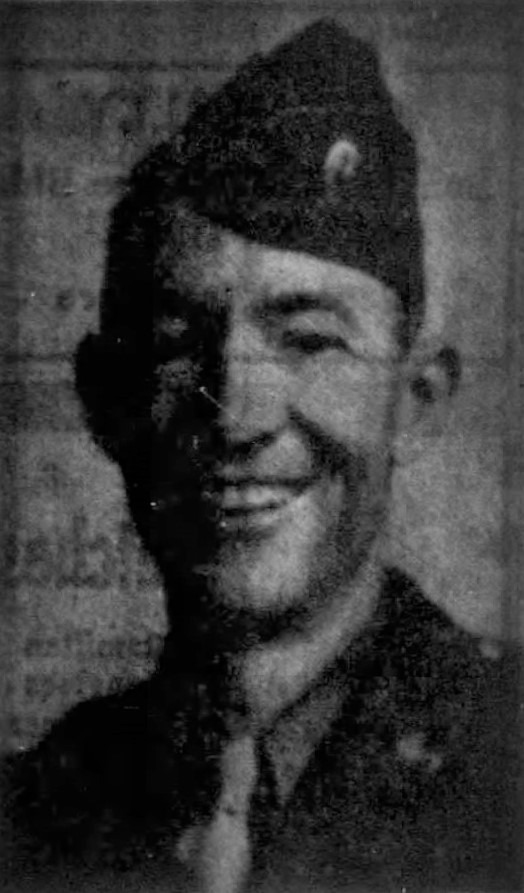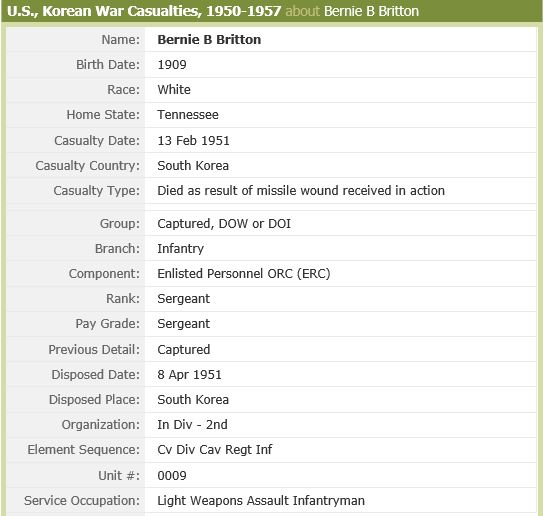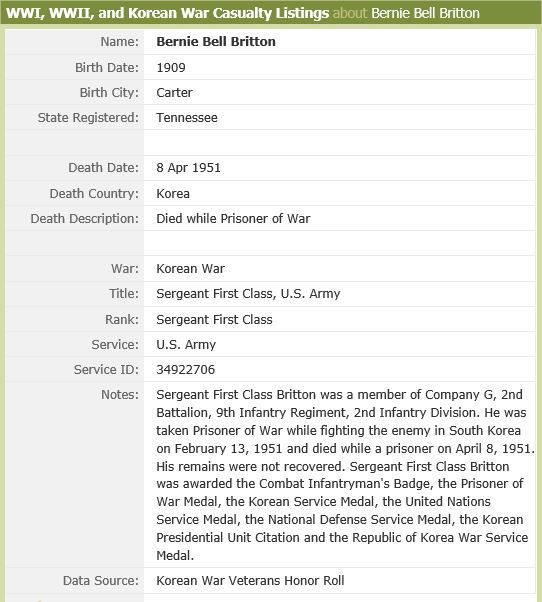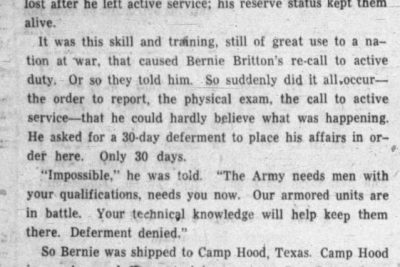Bernie Bell Britton was born on 18 August 1909 at Shell Creek, Carter County, TN. He was the son of Bernie Britton and Jane Erwin. Husband of Wilmetta Patton and father of Thomas E. Britton and daughters, Jane Britton Rockel and Jo Maria Britton Gadra.
Sergeant First Class Britton was a member of Company G, 2nd Battalion, 9th Infantry Regiment, 2nd Infantry Division. He was taken Prisoner of War while fighting the enemy in South Korea on February 13, 1951 and died while a prisoner on April 8, 1951. His remains were not recovered. Sergeant First Class Britton was awarded the Combat Infantryman’s Badge, the Prisoner of War Medal, the Korean Service Medal, the United Nations Service Medal, the National Defense Service Medal, the Korean Presidential Unit Citation and the Republic of Korea War Service Medal.
The Elizabethton Star, Oct. 13, 1953
The smiling soldier left Elizabethton, his family and friends three years ago today – October 13, 1950. He never came back. He was 40 years of age at the time he said goodbye to his quiet, brunette wife whose friends call her “Bill”, and to his daughters, Jody, then 11, and Jane, then 15.
This soldier’s name was Britton. Bernie Britton. Native East Tennessean, active Presbyterian Church member, former salesman, partner in a grocery business here with his brother-in-law, Roy Meredith.
Bernie was what the military fraternity calls a “re-tread.”That is, he had been a soldier in World War II and was recalled to active duty for Korea. He had listened to the military’s appeal for veterans to bolster the national defense structure by remaining on reserve status. He had joined the reserve. He had been place don the inactive list more than a year before he received his call to report for physical examination not long after the start of the Korean conflict. Sgt. Britton had been a skilled technical man during World War II. He was in the Armored Force, a tank man. But he was not a combat man; he was a maintenance expert. He served for more than two years during World War II – a comparatively old man, even then, as soldiers go – and was in charge of a maintenance repair shop at Fort Knox, Ky., at the time of his discharge. His skill and his training were not lost after he left active service; hsi reserve status kept thema live. It was this skill and training, still of great use to a nation at war, that cause Bernie Britton’s re-call to active duty. Or so they told him. So suddenly did it all occur – the order to report, the physical exam, the call to active service – that he could hardly believe what was happening. He asked for a 30–day deferment to place his affairs in order here. Only 30 days. “Impossible,” he was told. The Army needs men with your qualifications, needs you now. Our armored units are in battle. Your technical knowledge will help keep them there. Deferment denied.”
So Bernie was shipped to Camp Hood, Texas. Camp Hood is an Armored Force training center. But Sgt. Britton never was given the opportunity to do the job the Army had trained him for, never had a chance to use the skill and knowledge the Army told him was needed so badly. Instead he was shoved into the infantry, handed a rifle, given 18 days training altogether and shipped to the Far East. He arrived in Japan on December 13, 1950 – two months to the day after he left Elizabethton. Two months to the day after that, on February 13, 1951, he was reported missing in action. Two months after that he was dead, in some filthy Korean prison called the Bean Camp. It can be assumed that a tired, bewildered, unprepared old man was utterly without hope of survival. A prison buddy, a boy from Nebraska, wrote the family last week that he buried Bernie on the day after his death, April 7, 1951. So now Bill and Jane and Jody know. Bernie Britton, husband and father, was one of the estimated 6,000 Americans who died as captives in a war that never made very much sense and makes even less now. Of all its senselessness, the treatment of such men as Bernie Britton by brasshat U.S. Army functionaries is the worst. In dealing with reservists and others like Bernie – he was not alone, caught up in the tragedy – the United States Government stands accused of a crime worse than murder. It sent men not to die or lie according to the fortunes of war, but to die almost certainly as a result of stupidity of policy and treachery against those who had sought to serve as best they could. Bernie Britton believe evidently, that his country needed him. Neede his experience, his know-how. He had gained all that during World War II at government expense; he did not want to throw it away, to let it go to waste. And, quite simply, he was betrayed. God grant that this nation may never know war again. But God forbid that it ever know another whose men at arms are dealt with in such callous cruelty as was Sgt. Bernie Britton.
- Rank: Sergeant First Class
- Date of birth: 18 August 1909
- Date of death: 8 April 1951
- County: Carter
- Hometown: Elizabethton
- Service Branch: Army
- Division/Assignment: 9th Infantry Regiment, 2nd Infantry Division
- Conflict: World War II / Korean War
- Awards: Combat Infantryman's Badge, Prisoner of War Medal, Korean Service Medal, United Nations Service Medal, National Defense Service Medal, Korean Presidential Unit Citatio, Republic of Korea War Service Medal
- Burial/Memorial Location: Honolulu Memorial, Honolulu, Hawaii
- Location In Memorial: Pillar XX, Top Panel
- Contact us to sponsor Bernie B. Britton Jr.
Image Gallery
Click a thumbnail below to view at full size.





